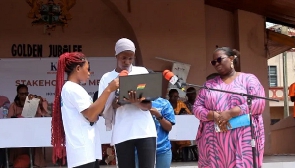[ad_1]
 Some participants at the fair
Some participants at the fair
The 2023 Kayayei Business and Leadership Fair was recently held in Kumasi, the capital of the Ashanti Region. This significant event was organized by the Purim African Youth Development Platform (PAYDP) Ghana, with support from the United Nations Population Fund (UNFPA).
The three-day event was dynamic and transformative, centered around the theme of “Empowering Kayayei for a Sustainable Future: Unleashing Potentials and Building Resilience.” The primary objective of the fair was to create opportunities for the marginalized Kayayei community in Ghanaian society and address the challenges they face.
Madam Mercy Adomah Besseah, the Ashanti Regional Director of the National Population Council (NPC), spoke to Oyerepa News after the event. She expressed her commitment to working alongside PAYDP to monitor the situation of the Kayayei community. Their aim is to identify opportunities for these individuals, such as furthering their education and acquiring valuable skills.
Madam Besseah also revealed that starting next month, the government (NPC), in collaboration with PAYDP and UNFPA, will engage parents, community leaders, and opinion leaders in the Northern region.
This region has a high prevalence of child marriage, and the goal is to educate these stakeholders on the importance of prioritizing their children’s education over early marriage. Additionally, they aim to discourage young girls from migrating to cities for Kayayei business.
Overall, the 2023 Kayayei Business and Leadership Fair was a significant step towards empowering the Kayayei community and addressing their unique challenges. The collaboration between PAYDP, UNFPA, and the government demonstrates a commitment to creating a sustainable future for these individuals and unlocking their full potential.
“Next month, we will be organizing a stakeholders’ meeting in the Northern Region. Our primary objective is to engage parents, opinion leaders, and the clergy in a discussion focused on the critical issues of child marriage and Kayeyei. It is disheartening to witness the prevalence of early marriages among girls in the northern regions.”
She continued: “Unfortunately, once a girl begins menstruating, she is often considered mature enough for marriage. However, it is crucial to emphasize that child marriage is not only morally wrong but also a criminal offence.”
“In light of this, our aim is to raise awareness and sensitize parents, guardians, and influential community members about the detrimental consequences of child marriage. By involving those who hold significant influence within the community, we hope to eradicate this harmful practice once and for all, she added.
“To achieve our goal, we will be conducting an informative session during the stakeholders’ meeting. This session will shed light on the legal implications and the long-term negative effects of child marriage. We firmly believe that by educating parents and guardians, we can empower them to make informed decisions that prioritize the well-being and future prospects of their children.”
“Furthermore, we recognize the importance of engaging opinion leaders and the clergy in this dialogue. Their support and endorsement are crucial in challenging the deeply ingrained cultural norms that perpetuate child marriage. By working together, we can create a united front against this social ill and pave the way for a brighter future for the girls in the northern regions,” the Ashanti NPC director said.
Speaking about the fair, Rev. Aku Xornam Kevi, the Executive Director of Purim African Youth Development Platform (PAYDP), emphasized that the event aimed to address the challenges and risks faced by Kayayeis in the Greater Accra, Ashanti, and Brong Ahafo regions. The goal was to ensure these marginalized girls had access to information and support, reducing their vulnerability.
Rev. Kevi explained that the integrated model employed a multi-dimensional approach to reach out to these girls. It included providing them with accurate reproductive health information and services, legal literacy and entrepreneurial skills, as well as sensitization on preventing and responding to gender-based violence and harmful practices.
One of the key challenges faced by the country, particularly with young people, is internal migration. Adolescent girls, in particular, often move from the northern regions to the middle belt and coastal areas in search of work. Many of these girls, known as Kayayei, engage in head porterage in urban markets, contributing to the nation’s economic vibrancy. However, they live in unacceptable conditions and are exposed to exploitation, abuse, and HIV/AIDS, among other risks.
Recognizing the potential for empowerment and socio-economic improvement within this marginalized community, PAYDP Ghana, with support from UNFPA, took on the responsibility of instituting the Kayayei Business and Leadership Fair as part of the Kayayei Integrated Model. This fair is held annually and builds upon previous interventions that have reached over 50,000 Kayayei. Its aim is to further address the challenges and risks faced by these girls in urban areas.
[ad_2]
Source link
